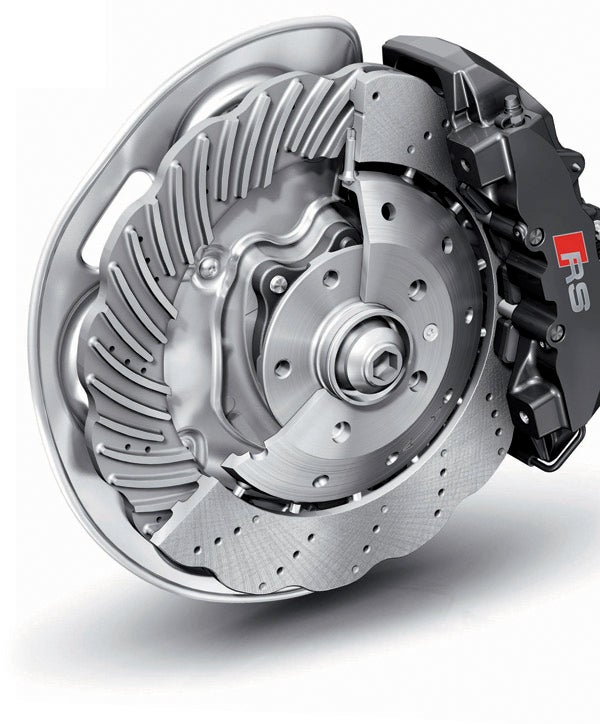 "signintokinjalol" (signintokinjalol)
"signintokinjalol" (signintokinjalol)
03/23/2014 at 23:47 • Filed to: None
 1
1
 13
13
 "signintokinjalol" (signintokinjalol)
"signintokinjalol" (signintokinjalol)
03/23/2014 at 23:47 • Filed to: None |  1 1
|  13 13 |

Bike tech going down into car tech. Though you could argue if these serve any real purpose compared to regular rotors...
 vdub_nut: scooter snob
> signintokinjalol
vdub_nut: scooter snob
> signintokinjalol
03/23/2014 at 23:50 |
|
I have some nice rotors on my mountain bike. I always loved the wavy rotors. I always assumed it was a heat dispersion thing, but I could never ascertain exactly why.
 signintokinjalol
> vdub_nut: scooter snob
signintokinjalol
> vdub_nut: scooter snob
03/23/2014 at 23:54 |
|
It's for both weight saving and heat dispersion. I'm guessing due to the smaller diameter of metal on contact, that less heat is transferred? Perhaps the waves in circular motion do something?
 NoahthePorscheGuy
> signintokinjalol
NoahthePorscheGuy
> signintokinjalol
03/23/2014 at 23:55 |
|
They look cool. Now Audi can charge as much as PCCB
 TheJWT
> signintokinjalol
TheJWT
> signintokinjalol
03/23/2014 at 23:58 |
|
Personally, I follow the Lotus philosophy for my bike...

 NoahthePorscheGuy
> TheJWT
NoahthePorscheGuy
> TheJWT
03/24/2014 at 00:02 |
|
simplify and add death?
 EL_ULY
> TheJWT
EL_ULY
> TheJWT
03/24/2014 at 00:04 |
|
Lol awesome
 YSI-what can brown do for you
> signintokinjalol
YSI-what can brown do for you
> signintokinjalol
03/24/2014 at 00:14 |
|
I have heard people say that these don't actually work as well as regular rotors, for cars at least.
 beardsbynelly - Rikerbeard
> signintokinjalol
beardsbynelly - Rikerbeard
> signintokinjalol
03/24/2014 at 00:17 |
|
if anything the edge of the rotor has an increased surface area for heat dissipation.
 nlzmo400r
> signintokinjalol
nlzmo400r
> signintokinjalol
03/24/2014 at 01:17 |
|
The reasoning behind wave rotors is simple (and somewhat pointless for cars). They do offer a minimum weight savings - although not much. When a brake pad comes across a new surface edge, the pad provides a noticable 'bite'. The benefit of the wave rotor is primarily the fact that every wave offers a new friction surface and edge for the pad to bite on to. This is why motorcycles are much more commonly seen with them - a rider as a much more intimate feel with the brakes than a driver does.
Regarding heat dissipation, they're actually worse than 'full rotors.' More surface area -more heat dissipation.
 nlzmo400r
> signintokinjalol
nlzmo400r
> signintokinjalol
03/24/2014 at 01:25 |
|
There is a small weight advantage.
Thermally, wave rotors are worse than standard 'full' rotors. More surface area - more heat dissipation. However, without getting super deep into fluid dynamics, I'm sure a beneficial wave pattern could be cut into the rotor to help create a low pressure zone behind the wave and pull cool air past the rotor faster than a standard blank rotor could. This probably wouldn't apply to large vaned car rotors - only thin non vaned motorcycle discs.
The primary benefit of the wave rotor is that each wave provides a new edge or contact area for the pad to grab. This gives the pad more 'bite' each time it passes a wave surface. This is why they're more common on motorcycles than cars - a rider has a much more intimate connection with the brakes through a lever than a driver through the pedal/abs/linked brakes etc.
 vermillion-fire
> signintokinjalol
vermillion-fire
> signintokinjalol
03/24/2014 at 02:48 |
|
Increased surface area around the perimeter face I think.
 crown victor victoria
> signintokinjalol
crown victor victoria
> signintokinjalol
03/24/2014 at 09:50 |
|
They do serve a purpose. It was a weight-savings move:
Audi says the brakes save 9 pounds of unsprung weight
http://www.motortrend.com/roadtests/coup…
A savings, which the article mentions, is totally negated by the 20" wheels that weigh over 30 lbs. each.
 neon wario
> signintokinjalol
neon wario
> signintokinjalol
03/24/2014 at 11:41 |
|
For a given weight, material, etc. wavy brake rotors will have more surface area, which means more effective cooling. I doubt it's enough to make a huge difference, partially because if it was, we'd probably see it on more cars, but I don't work at Quattro, so who knows.